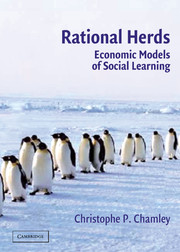12 - Learning to Coordinate
Published online by Cambridge University Press: 12 January 2010
Summary
— C'est une révolte?
— Non Sire, une révolution.
In an economy with strategic complementarities, the structure of individual payoffs evolves randomly and slowly. When agents have perfect information on the payoffs' structure, multiple equilibria may occur in some phases. Under imperfect information, the existence of a SREE is shown in which a strong hysteresis effect takes place: the level of aggregate activity hovers near its value in the previous period most of the time and jumps to a different level with a small probability. Applications may be found in macroeconomics and revolutions.
In the previous chapter, the coordination gamewith strategic complementarities took place in one period. All individuals were thinking simultaneously without learning from the past. The process of equilibrium selection between a high and a low level of aggregate activity rested on the agents' imperfect information about others' payoffs and the possibility that the fundamentals of the economy took “extreme values” where one action (e.g., investment or no investment) was optimal independently of others' actions. In the one-period setting, there is no possibility of learning.
In this chapter, agents learn from the actions taken in the past by others. Social learning may affect critically the assumptions that were made in the one-period context. For example, the observation that few agents invest in some period rules out the extreme event that investment is a dominant strategy for a large fraction of the population. We will see that when agents learn fromhistory, a strongly rational-expectations equilibrium (SREE) exists if the degree of heterogeneity between agents is neither too large nor too small, an assumption that fits the macroeconomic context.
Information
- Type
- Chapter
- Information
- Rational HerdsEconomic Models of Social Learning, pp. 268 - 287Publisher: Cambridge University PressPrint publication year: 2003
